Jul 4, 2025
Companies Complicit in Israeli Abuses ‘Stand to Take a Major Hit’: Analysis
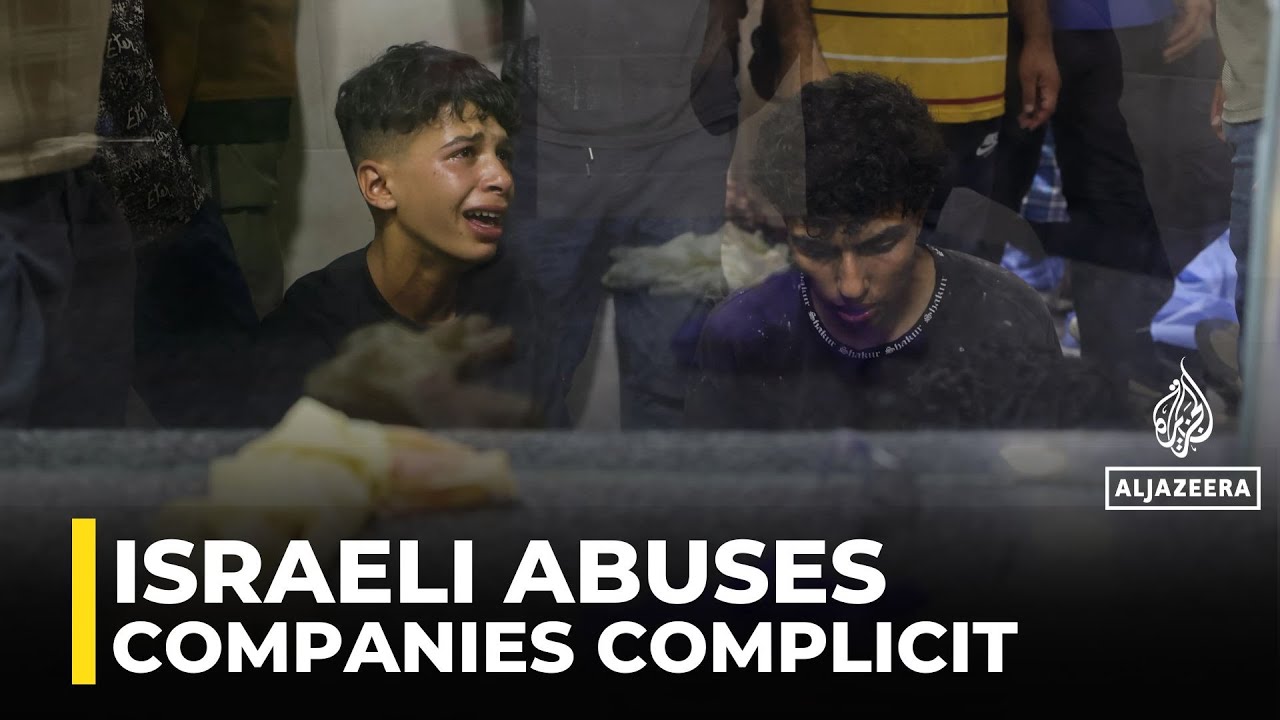
In a recent in-depth analysis, Mohamad Elmasry, a professor of media studies at the Doha Institute for Graduate Studies, sheds light on a groundbreaking report by UN Special Rapporteur Francesca Albanese. The report exposes the complicity of some of the world’s largest corporations in Israeli abuses, raising serious legal questions and creating significant reputational risks for these firms. Alongside this, Dr. Tarek Loubani, an emergency physician and medical director of Glia International, shares his harrowing firsthand experiences from Gaza, revealing the brutal realities faced by Palestinians as they struggle to access basic humanitarian aid.
Table of Contents
- The Corporate Complicity Report: A Wake-Up Call
- The Crucial Role of a Ceasefire
- Firsthand Testimony from Gaza: The Human Cost of Conflict
- International Outrage and Responsibility
- Conclusion: The Urgency of Accountability and Humanitarian Relief
- Frequently Asked Questions (FAQ)
The Corporate Complicity Report: A Wake-Up Call
The report by Albanese names over forty companies spanning diverse industries, far beyond the expected arms manufacturers. It includes major players in banking, finance, and big technology firms such as Microsoft, Amazon, and Google. These companies, known for investing heavily in public relations and reputation management, now face steep challenges as their involvement in Israeli abuses comes under scrutiny.
Mohamad Elmasry highlights the dual impact of this report: “All of the legal accountability or potential legal accountability aside, this is going to be bad public relations for those companies, especially if they turn up on boycott lists, and some of them already are.” The reputational damage could translate into tangible effects, as consumer and activist pressure has historically influenced corporate behavior in conflict zones.
Elmasry points out that this report is part of a larger pattern: “Multiple cases are being made against Israel. Report after report has been produced to help make this case, and there already is an impact.” Although the ongoing genocide and occupation continue unabated in the short term, Israel’s international standing is deteriorating, and companies supporting its actions are increasingly vulnerable to backlash.
Will This Momentum Lead to Sanctions?
The question remains whether this report will catalyze sanctions against Israel. Elmasry suggests that while the report alone is not decisive, it contributes to building momentum: “It's becoming very expensive to support Israel through its worst atrocities.” The hope is that mounting international pressure, combined with corporate risk, might push for meaningful change.
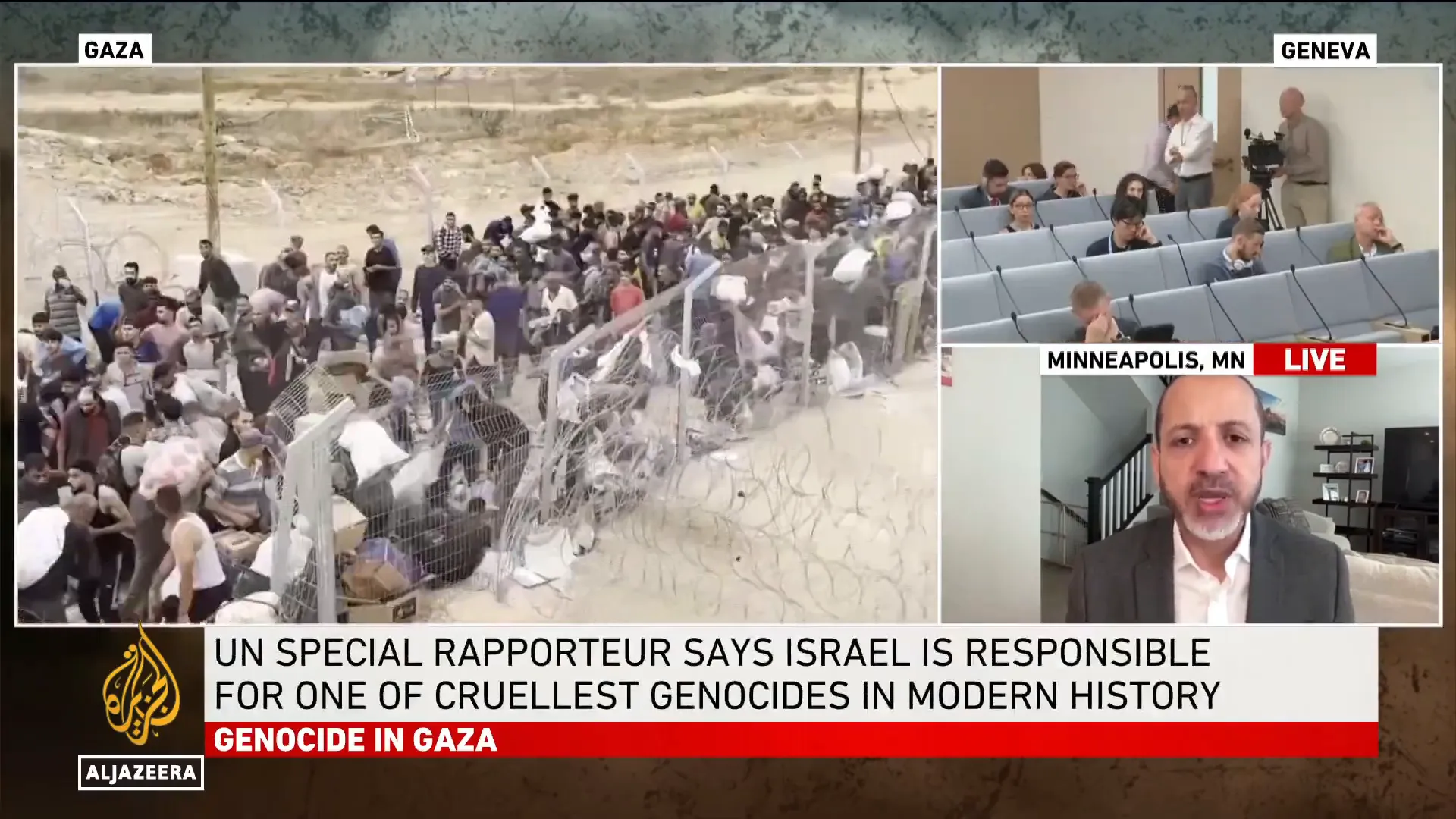
The Crucial Role of a Ceasefire
One critical factor that could halt the ongoing violence is a ceasefire. Elmasry explains the complexities surrounding this possibility, noting a fundamental impasse: “The main sticking point continues to be whether or not Israel will agree to a permanent end to the war.” Hamas demands a complete cessation, while Israel insists on retaining the right to resume conflict, making negotiations extremely difficult.
However, there might be a political window of opportunity soon. The Israeli parliament, the Knesset, is heading into a three-month recess, during which it would be less politically costly for Prime Minister Benjamin Netanyahu to agree to a ceasefire. “I think there’s potentially light at the end of the tunnel,” Elmasry says cautiously, “I don’t want to say I’m optimistic, but I think there’s a chance.”
Firsthand Testimony from Gaza: The Human Cost of Conflict
Dr. Tarek Loubani offers a stark, heartbreaking account from Khan Yunis in southern Gaza. As an emergency physician witnessing the aftermath of violence, his testimony paints a grim picture of the humanitarian crisis. He describes mass casualty incidents where hundreds of Palestinians are shot at while attempting to access aid.
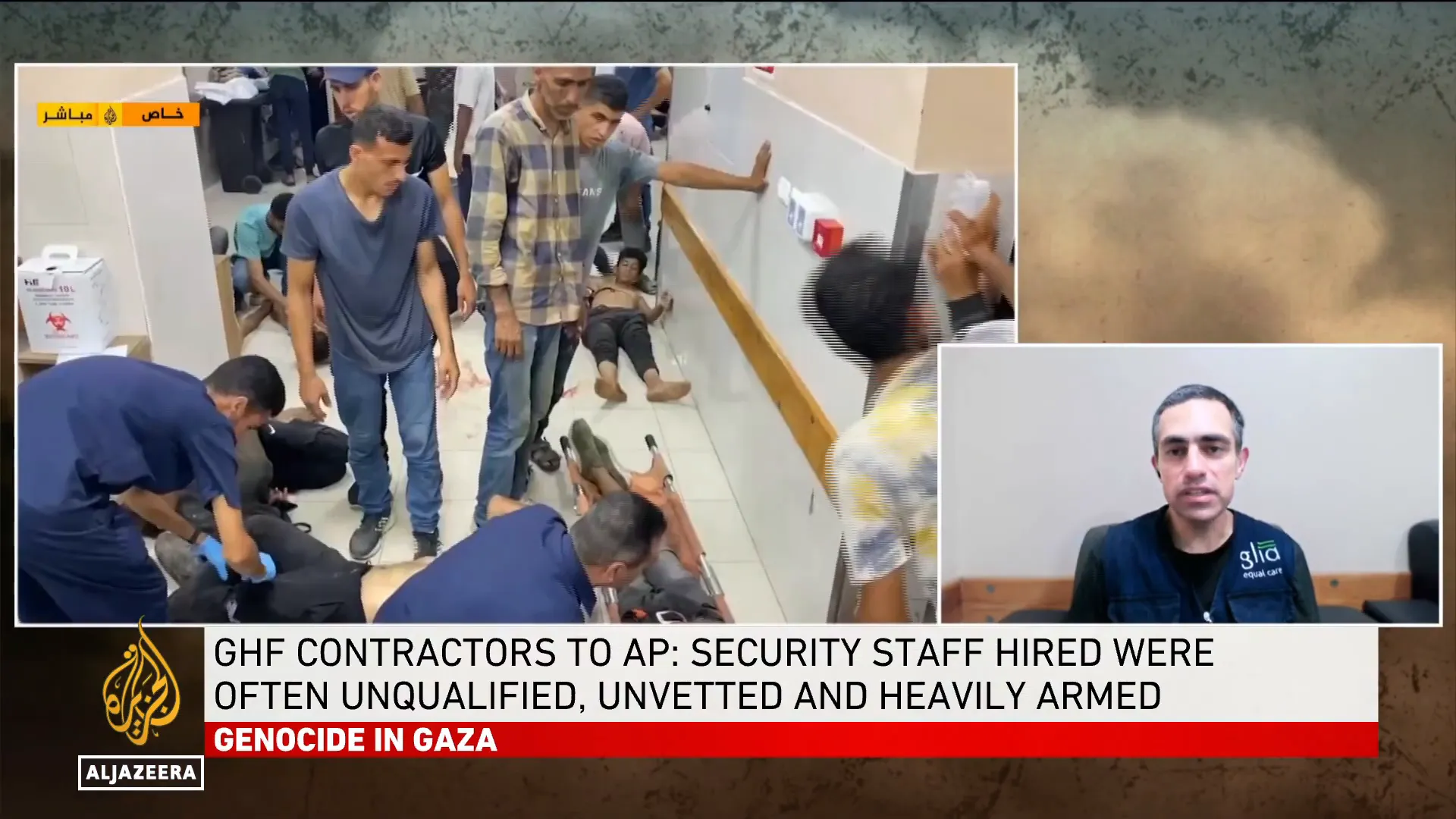
“Anytime the Palestinians try to approach aid or try to get aid, they are fired upon,” Loubani states. The injuries he treats are severe and targeted—gunshots to the head and neck, often from snipers, alongside widespread machine-gun fire and explosive injuries caused by artillery shelling or bombs dropped from quadcopters.
He emphasizes the deliberate nature of these attacks: “Patients can be sitting there doing nothing, waiting for the site to open, and then they get shot in the head. I’ve seen that numerous times.” The pattern of injuries and the scale of casualties leave no doubt about the intent behind these acts.
The Gaza Humanitarian Foundation and Perpetuation of Starvation
Loubani also criticizes the Gaza Humanitarian Foundation (GHF), highlighting its controversial role in the crisis. According to him, the GHF’s operations involve a “thin veneer” of aid distribution that masks a cruel game of chance and luck for starving people. The food provided is often not nutritious or sufficient, and critical supplies such as baby formula are withheld or blocked, exacerbating the famine and starvation.
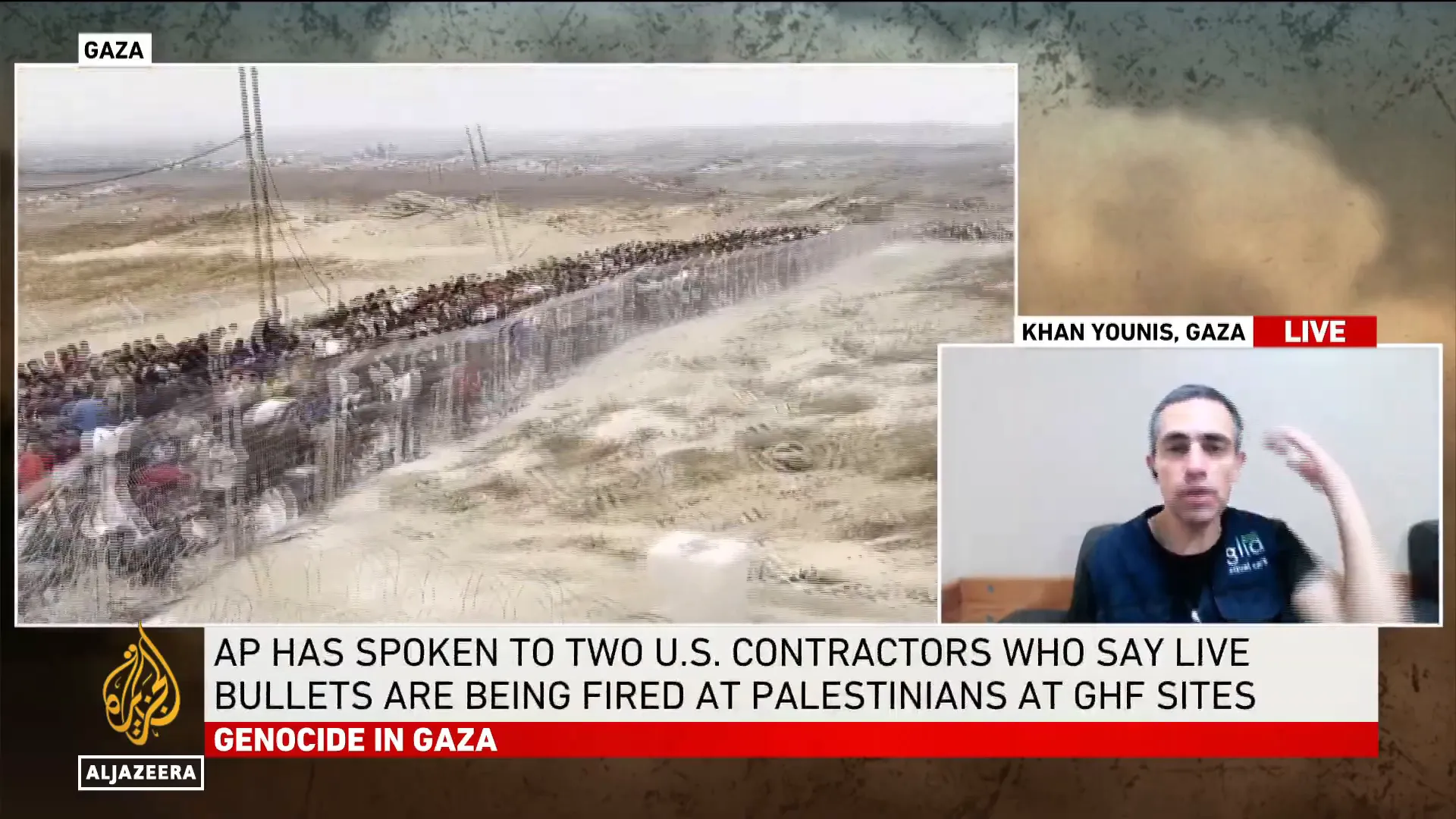
The GHF’s denials of wrongdoing are described as “delusionally obscene,” especially when contradicted by footage showing armed personnel claiming safety amid active gunfire. This disconnect between rhetoric and reality highlights the manipulation faced by those in desperate need of aid.
International Outrage and Responsibility
Despite the overwhelming evidence and the scale of suffering, Dr. Loubani points out a disturbing lack of outrage at the highest levels of the international community. “Every single NGO that works in Gaza, pretty much international leadership, there is a lot of outrage,” he says, “but my own government in Canada is an active participant in this genocide, and so are most Western governments.”
He suggests this muted response stems from complicity rather than indifference: “They’re not outraged because they’re active participants, and they’re happy with the thin veneer.” This grim reality underscores the vital role of NGOs, civil society, and global activists in demanding accountability and an end to the atrocities.
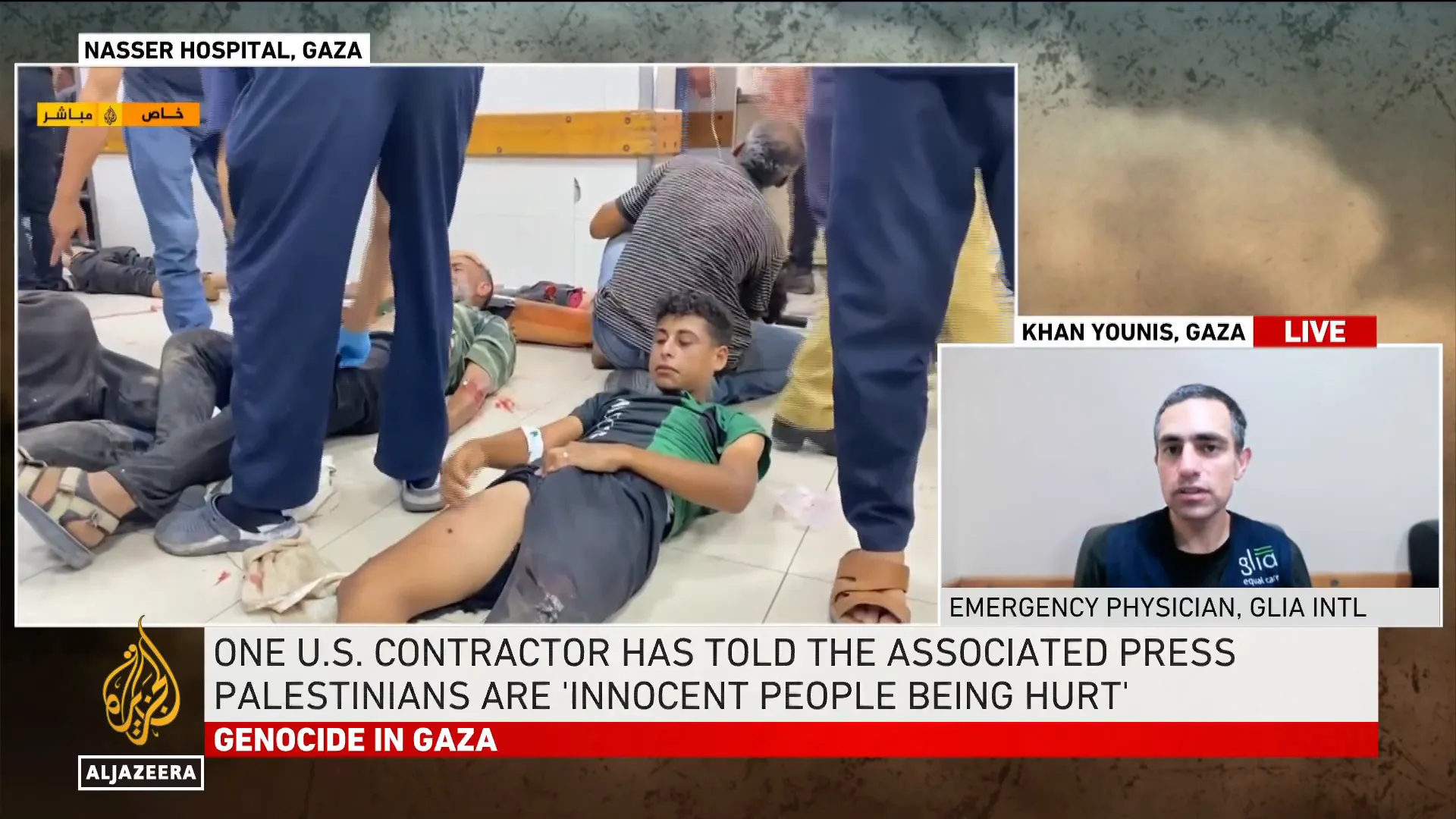
Conclusion: The Urgency of Accountability and Humanitarian Relief
The report exposing corporate complicity in Israeli abuses adds a crucial dimension to the ongoing conflict, highlighting the intersection of business interests, international law, and human rights. As companies face growing reputational and legal risks, the pressure to sever ties with abusive practices intensifies.
Meanwhile, the human toll in Gaza remains devastating, with civilians—especially children—caught in the crossfire of a brutal conflict compounded by starvation and restricted aid. The testimonies from the ground demand urgent attention, solidarity, and action from the global community.
Only through sustained international pressure, transparent accountability, and genuine humanitarian efforts can there be hope for peace and justice in this deeply troubled region.
Frequently Asked Questions (FAQ)
What companies are implicated in the report on Israeli abuses?
The report names over forty companies from various sectors, including weapons manufacturers, banking and financial institutions, and major tech companies like Microsoft, Amazon, and Google.
How does corporate complicity affect the conflict?
Companies supporting Israeli actions risk legal accountability and reputational damage, which can translate into financial and operational consequences. This pressure can influence corporate behavior and potentially affect broader political dynamics.
What are the main obstacles to a ceasefire in Gaza?
The primary obstacle is Israel’s unwillingness to agree to a permanent end to the war, as it insists on retaining the right to resume military action. Hamas seeks a complete and permanent cessation of hostilities, making negotiations challenging.
What kind of injuries are being treated in Gaza?
Medical professionals are treating gunshot wounds, including targeted sniper shots to the head and neck, injuries from machine-gun fire, explosive injuries from artillery shelling, and bombings from drones.
What role does the Gaza Humanitarian Foundation play in the crisis?
The GHF is criticized for its controversial aid distribution methods, which allegedly perpetuate famine and starvation by providing insufficient and non-nutritious food and restricting vital supplies like baby formula, all while exposing civilians to dangerous conditions.
Why is there limited outrage from the international community?
According to experts, many Western governments are complicit in the ongoing abuses and genocide, leading to a muted response. NGOs and civil society groups remain critical voices calling for accountability and change.